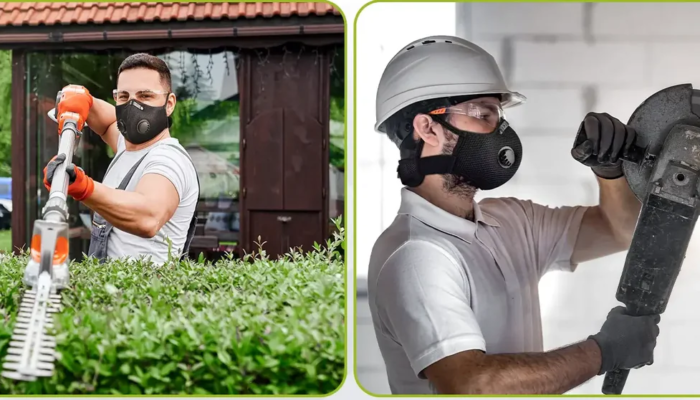As a woodworker, you’re likely familiar with the importance of using a respirator to protect yourself from wood dust and fumes while working on projects. But have you ever wondered if your trusty woodworking respirator could also be used to protect against wildfire smoke and dust? Let’s explore this possibility and see if your workshop gear can double as emergency equipment.
A Personal Story
I recall a summer when wildfires ravaged our region, leaving a thick haze of smoke in the air. As a woodworker and outdoor enthusiast, I was concerned about how to stay safe. I remembered my GVS Elipse P100 respirator, which I use for sanding and other dusty tasks. I wondered if it could help filter out the particulate matter from the wildfire smoke. After some research, I discovered that while it could offer some protection, it wasn’t designed to handle gases present in wildfire smoke.
How Effective Are Woodworking Respirators Against Wildfire Smoke?
Woodworking respirators, such as those with P100 filters, are highly effective at capturing fine dust and particulates. However, wildfire smoke contains not only particulate matter but also harmful gases like volatile organic compounds (VOCs) and other irritants. Most woodworking respirators are not equipped to filter these gases, making them less effective for comprehensive protection against wildfire smoke.
Example: The GVS Elipse P100
The GVS Elipse P100 respirator is excellent for woodworking, offering a compact, lightweight design with low breathing resistance. However, it primarily filters particulates, not gases. For wildfire smoke, you would need additional protection against gases, such as an organic vapor cartridge.
What Filters Do You Need for Air Pollution Protection?
For protection against air pollution, including wildfire smoke, you need filters that can handle both particulates and gases. N95 filters are good for capturing particulate matter, but they do not filter gases. P100 filters offer even better particulate protection, capturing 99.97% of airborne particles. However, for comprehensive protection, you should consider using a multi-gas cartridge in addition to a P100 filter.
Choosing the Right Filter
- N95 Filters: Good for particulate matter, but not gases.
- P100 Filters: Better for particulates, capturing 99.97% of particles.
- Multi-Gas Cartridges: Essential for filtering gases like VOCs and acid gases.
Breathing Comfort: Are Woodworking Respirators Practical for Outdoor Use?
Woodworking respirators are designed for comfort during continuous use in workshops. They often feature adjustable nose clips and silicone components to ensure a snug fit. However, when used outdoors in smoky conditions, the valve and mesh components might not be as effective at managing moisture, potentially leading to discomfort.
Example: The BASE CAMP Mask
The BASE CAMP dust mask is known for its adjustable fit and carbon filters, which are great for woodworking. However, in smoky outdoor conditions, the lack of a full face design might leave eyes unprotected from irritants.
Reusable vs. Disposable: Which One is Better for Emergency Use?
In emergency situations like wildfires, disposable masks are convenient and easy to use, but they may not offer the same level of protection as reusable respirators with P100 filters. Reusable respirators can be more cost-effective in the long run and provide better filtration efficiency, but they require maintenance and proper storage.
Considerations
- Disposable Masks: Easy to use, but less effective and less eco-friendly.
- Reusable Respirators: More effective, cost-efficient, but require maintenance.
Are P100 and N95 Filters Good for Wildfire Smoke?
P100 filters are excellent for capturing particulates in wildfire smoke, offering superior protection compared to N95 filters. However, neither filter type protects against gases without additional cartridges. For comprehensive protection, consider using a P100 filter with a multi-gas cartridge.
Comparison
| Filter Type | Particulate Protection | Gas Protection |
| N95 | 95% of particulates | No |
| P100 | 99.97% of particulates | No |
| P100 + Multi-Gas | 99.97% of particulates | Yes |
Best Multi-Purpose Respirators for Home and Workshop Use
For both woodworking and potential use in smoky conditions, consider a half-face respirator like the GVS Elipse P100 or a full-face respirator for maximum protection. These can be equipped with P100 filters and organic vapor cartridges for enhanced protection.
Recommendations
- GVS Elipse P100: Excellent for woodworking, with a compact design and low breathing resistance.
- 3M 6502QL/49489: A versatile half-face respirator that can be fitted with various filters for different tasks.
Final Recommendation: Should You Use Your Workshop Respirator for Smoke?
While your woodworking respirator can offer some protection against wildfire smoke, it’s crucial to ensure it’s equipped with the right filters for comprehensive protection. If you’re in an area with significant smoke and gas exposure, consider upgrading to a respirator designed for both particulate and gas filtration. Always prioritize proper fit and maintenance to maximize protection.
Conclusion
In conclusion, while woodworking respirators are excellent for protecting against wood dust and fumes, they may not be fully equipped to handle the complexities of wildfire smoke without additional components. By understanding the limitations and capabilities of your respirator, you can make informed decisions about when and how to use it effectively in emergency situations.
